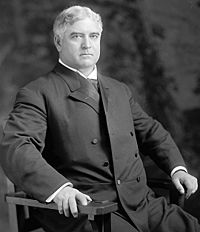Ashton C. Shallenberger
| Ashton C. Shallenberger | |
|---|---|
 |
|
| 15th Governor of Nebraska | |
|
In office January 7, 1909 – January 5, 1911 |
|
| Lieutenant | Melville R. Hopewell |
| Preceded by | George L. Sheldon |
| Succeeded by | Chester Hardy Aldrich |
| Member of the U.S. House of Representatives from Nebraska's 4th district | |
|
In office March 4, 1933 – January 3, 1935 |
|
| Preceded by | John N. Norton |
| Succeeded by | Charles Gustav Binderup |
| Member of the U.S. House of Representatives from Nebraska's 5th district | |
|
In office March 4, 1931 – March 3, 1933 |
|
| Preceded by | Fred Gustus Johnson |
| Succeeded by | Terry Carpenter |
|
In office March 4, 1923 – March 3, 1929 |
|
| Preceded by | William E. Andrews |
| Succeeded by | Fred Gustus Johnson |
|
In office March 4, 1915 – March 3, 1919 |
|
| Preceded by | Silas Reynolds Barton |
| Succeeded by | William E. Andrews |
|
In office March 4, 1901 – March 3, 1903 |
|
| Preceded by | Silas Reynolds Barton |
| Succeeded by | William E. Andrews |
| Personal details | |
| Born |
Ashton Cokayne Shallenberger December 23, 1862 Toulon, Illinois |
| Died | February 22, 1938 (aged 75) Franklin, Nebraska |
| Political party | Democratic |
| Spouse(s) | Eliza Zilg |
| Children | 2 |
| Profession | Politician |
Ashton Cokayne Shallenberger (December 23, 1862 – February 22, 1938) was a Nebraska Democratic politician and the 15th Governor of Nebraska from 1909 to 1911.
Shallenberger was born in Toulon, Illinois on December 23, 1862. He was educated in the public schools and attended the University of Illinois at Urbana–Champaign. He was married to Eliza Zilg in 1885 and they had two children.
After a move to Stromsburg, Polk County, Nebraska, in 1881, Shallenberger became a clerk, a banker and a rancher. He moved to Alma, Harlan County, Nebraska in 1887 and founded the Bank of Alma. He was first elected to the 57th United States Congress but failed to be reelected in 1902.
In 1902, he was part of a group of men who were startled by the apparition of the Woman in Black (supernatural). Three reputable men claimed to have been spooked at the same time by the mysterious and ghostly lady in black on March 16, 1902. H. S. Wetherald, editor of the Alma Journal; Frank Griggsby, the area's leading carriage dealer; and Ashton C. Shallenberger, then the congressman of Nebraska's Fifth District.
His first attempt at the Governorship came in 1906, running under a Fusion label of the state Democratic and Populist parties, where he lost to Republican George L. Sheldon. He was then elected governor in 1908, defeating Sheldon in a narrowly won rematch. Shallenberger served from 1909 to 1911, his tenure included the adoption of the State Guarantee of Deposits Law and the "Oregon Plan", a direct primary bill regarding the election of United States Senators. He did not run for a second term in 1910.
Unsuccessful in running for Senate from Nebraska in 1912, Shallenberger was elected a congressman to the 64th and 65th congresses (1915–1919), but was unsuccessful in being reelected to the 66th in 1918. He was a delegate to the Democratic National Convention in 1920, and was elected to the 68th, 69th, and 70th congresses from 1923 to 1929. Unsuccessful in being reelected to the 71st in 1929, but was successful in running for the 72nd and 73rd (1931–1935). He failed to be renominated in 1934, and returned to banking and breeding shorthorn cattle. Shallenberger was one of four governors (three of Nebraska, one of Wyoming) to come from the city of Osceola, Nebraska.
...
Wikipedia
